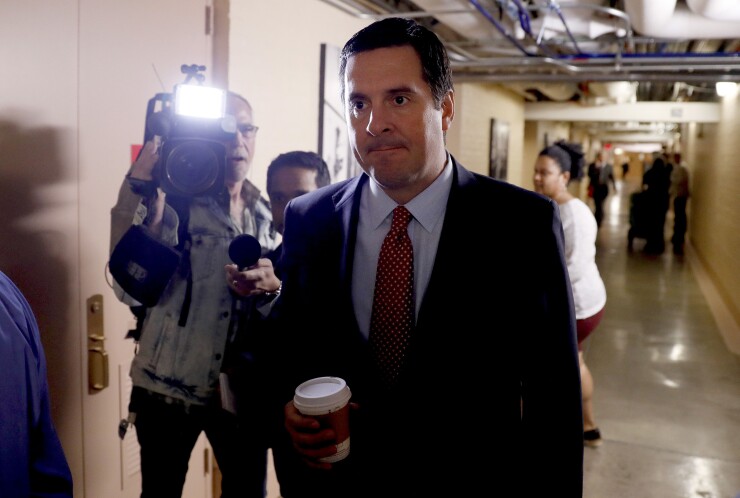WASHINGTON – Two bond- and infrastructure-related pension bills have been introduced in the House this summer and one of them has raised the hackles of state and local labor and retirement groups.
The Public Employee Pension Transparency Act (HR 6290), introduced by Rep. Devin Nunes, R-Calif., on June 28, has drawn opposition from almost two dozen groups.

Virtually identical to legislation that Nunes has introduced in every Congress since 2011, PEPTA would prohibit states and localities from issuing tax-exempt bonds unless they file annual reports on their public pension systems to the U.S. Treasury Department.
The reports must be available to the public through a searchable website and must include liabilities of the pension plan, the value of plan assets, the percentage of the plan that is funded, contributions made to the plan, projections of cash flows associated with liabilities, actuarial assumptions, investment returns, and any outstanding pension obligation bonds.
Pension plan sponsors would have to value their pension assets and liabilities using a so-called riskless rate of return based on interest rates pegged to the Treasury
spot rate yield curve.
The bill also states that state and local pension obligations are solely the responsibility of those governments and that the federal government will not provide a bailout.
When a draft of the bill was being circulated to lawmakers in June, 19 groups wrote House Ways and Means Committee Chairman Kevin Brady, R-Texas, urging him to oppose any such legislation.
“This bill would set a dangerous precedent with regard to unfunded federal mandates, taxation of municipal bonds, and intrusion into the operations of state and local governments,” wrote the groups, which included the National Conference of State Legislatures, the Government Finance Officers Association, the National League of Cities, and the National Association of State Retirement Administrators.
“PEPTA does not protect benefits, save taxpayer dollars or improve retirement system financing,” the groups told Brady. “To the contrary, it conflicts with existing governmental accounting standards, inserts the federal government into areas that are the fiscal responsibility of sovereign states and localities, imposes costly federal regulation, and threatens to eliminate the tax-exempt bonding authority of state and local governments.”
The groups said the financial information for state and local retirement systems is already publicly available on searchable databases, on state and local websites as well as on Public Plans Data.
Public pension plans are already subject to significant oversight, regulation and transparency, they said.
“The legislation not only violates the principles of federalism, but represents a fundamental lack of understanding regarding state and local government operations and financing, including accounting standards and strict legal constraints already in place that require open financial reporting and processes,” the groups wrote Brady.
“Federal interference into the fiscal affairs of state and local governments is neither requested nor warranted,” they added.
The National Fraternal Order of Police sent a separate letter to Brady and Rep. Richard Neal from Massachusetts, the top Democrat on the committee, warning the bill contains mandates that are “inconsistent, and administratively burdensome and costly to state and local government budgets, which are already under strain.”
The other bill – Strengthening Pensions through Investment in Infrastructure Act (HR 6276) – was introduced by Rep Mike Bishop, R-Mich., on June 28 and would allow public pension funds to invest in infrastructure projects that were financed with tax-exempt bonds.
Specifically, the bill would modify the tax rules so that public pension funds could invest in bond-financed infrastructure projects, without causing the bonds to be treated as private activity bonds that might be taxable.
Bonds are private activity bonds if more than 10% of the proceeds are used by a private party and more than 10% of the debt service is secured or paid by a private party. They are taxable PABs if they are used to finance projects that do not fall within certain categories that are “qualified” for tax exempt financing.
Specifically, the bill would eliminate the private business use test for public pension funds investing in bond-financed infrastructure.
The bill also would codify a recent clarification proposed as effective by the Treasury Department and Internal Revenue Service.
The clarification in Notice of Proposed Rulemaking [REG-106977-18], released in June, would mean that if a state or local pension fund wanted to invest in a tax-exempt-financed infrastructure project, then the outstanding bonds or any bonds issued in the future for the project would not be considered as taxable arbitrage bonds.
The bill specifically states that public infrastructure property would not be treated as investment property for arbitrage bonds.





